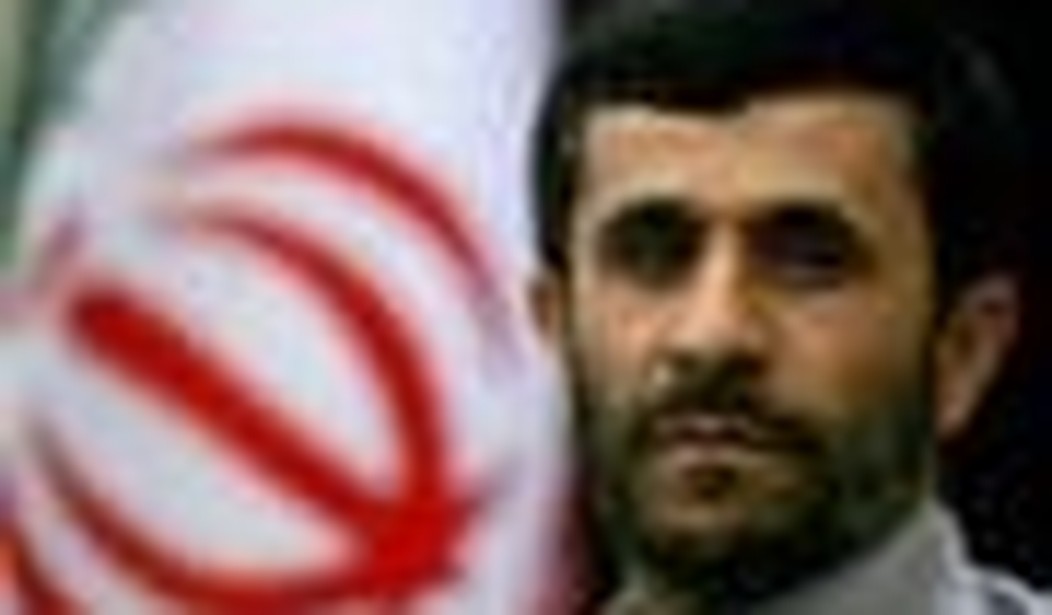The news that the U.S. has agreed to be present at future EU-Iran nuclear talks is a positive sign that Washington has decided to learn from its recent achievements with North Korea.
Until today, the U.S. has left it to the Europeans, and their chief policy advisor Javier Solana, to negotiate with Iran. However, from now on, just as the case with North Korea, the U.S. will be present at the negotiations.
“The substance remains the same, but this is a new tactic,” said White House spokeswoman Dana Perino. “What this does show is how serious we are when we say that we want to try to solve this diplomatically,” she added. And indeed it does. This move will also allow the U.S. to become closer to Sunni countries such as Saudi Arabia who have called for a bigger U.S. diplomatic push on this front.
This is in addition to recent news that the U.S. is going to open an interest section in Tehran, a move which was welcomed by Mahmoud Ahmadinejad. Both moves are likely to increase U.S. leverage against Iran, while adding credibility to the position of Washington as a strong power broker in the Middle East.
This shift in policy, which comes after 30 years of strained relations between the two sides, has come at the right time. Iran’s position in the region has been gathering strength. As well as scoring successes in Iraq, the recent prisoner exchange between Israel and Hezbollah has given Tehran even more influence.
To those in the region who want to see a weakened Israel, Iran’s ally Hezbollah has proved to them that hostage-taking works, and that Israel is prepared to pay any price, including the release of murderers such as Samir Kuntar. And Hezbollah’s leader did not hide his glee. Ridiculing what he called the failure of Israeli intelligence to determine the fate of its two soldiers, he told a massive crowd in Beirut that “had the Zionists been able to establish that their two soldiers are dead, they would have demanded a different outcome.”
And this is not the end of it. The taste of success has left many pro-Hezbollah Lebanese wanting more. They now want to pressure Israel to “return” the Shebaa farms, even though according to the UN it is not Lebanese territory: it is Syrian. This trick was put together by Damascus after Israel’s withdrawal from Lebanon in May 2000. Once the UN confirmed that Israel had abided by all the requirements from UN Security Council Resolution 425, and was no longer occupying Lebanese territory, Damascus suddenly panicked. It realized that its ally Hezbollah no longer had any justification to attack Israel. Consequently, it decided to “donate” the Shebaa farms, which is close to the Golan, to Lebanon. However, to the fury of anti-Syrian elements in Lebanon, such as Walid Jumblatt, Assad refused to sign a document endorsing this.
Nevertheless, Hezbollah gratefully accepted the verbal promises of Syria and now wants to use its new leverage to pressure Israel to return the territory to Lebanon. What should worry Jerusalem and Washington is that Hezbollah and Lebanon’s pro-Syrian president Michel Suleiman want to do this with Syria’s help. In other words, by releasing the Hezbollah hostages, Israel inadvertently helped calls for the return of Syria to Lebanese politics. Furthermore, the rise of Hezbollah’s influence in the region makes it even more difficult and unattractive for Syria to break ranks with Iran, a condition which Israel has demanded as part of the peace talks.
The invasion of Iraq showed that application of military power can bring limited political gains. The entrance of the United Sates into negotiations with Iran will enable the U.S. to augment its military presence in the region, in order to pressure Tehran. As strong as Iran may be in the Middle East, it is still susceptible to pressure, as shown recently by the exit of the French oil giant Total from Iran’s gas sector. This was a heavy blow to Ahmadinejad’s government.
More sanctions could be on the way if Tehran continues to act belligerently and defy UN calls for the temporary suspension of its enrichment program. And now, Tehran no longer has the excuse that America is not interested in negotiations. It is time to allow the State Department to become involved in arenas where the Department of Defense has no reach.








Join the conversation as a VIP Member